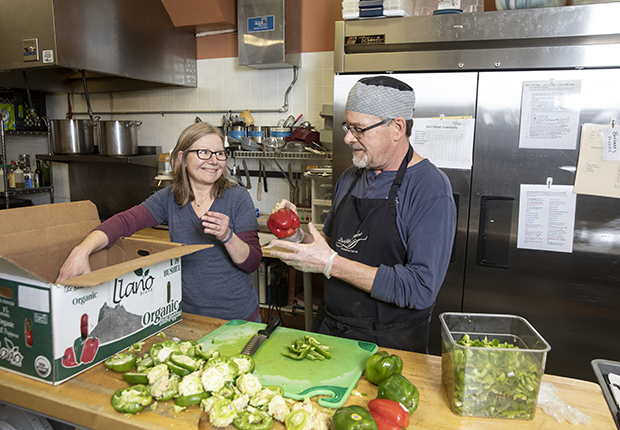AARP Hearing Center

By Joanne Cleaver
Ten years ago, residents of southwestern Wisconsin were surrounded by farms but didn’t have reliable, year-round access to locally produced food.
Bill and Heidi McBeth, then 53 and 44, respectively, stepped in to collaborate with other near-
retirees to expand the summer farmers market into a grocery store supplied by local farms.
Now, Bill McBeth, a retired professor, works full time at Driftless Market alongside his wife and cofounders Robin Timm, 61, and Jayne Dunnum, 62.
Their market, with eight part-time staff, is a mainstay of Platteville’s revitalizing downtown. “Older people bring a lot of skills and understanding” to entrepreneurial ventures, McBeth said.
“People my age and older want to keep working, whether it’s helping other people, running our own businesses or both. This is my way of creating a better world.”
AARP Wisconsin’s Silver Dividend campaign, which kicked off with this month’s opening of the state legislative session, wants to “change the conversation,” according to Helen Marks Dicks, the state issues advocacy director for AARP Wisconsin.
The campaign urges investment in initiatives like job training for older adults and caregiver and aging programs.
Those investments can reduce the government-funded aid people will need over the long term and help them remain in their homes and communities, AARP and its volunteers argue. Members can get involved by contacting their state lawmakers and following the Silver Dividend campaign at aarp.org/wi.
Many older residents contribute to local economies through taxes, business ownership, volunteer work, paid employment and unpaid caregiving.
A recent AARP report estimated that households headed by people 50 and older accounted for 56 percent of total consumer spending in Wisconsin in 2016.
That makes it worthwhile for the state, local governments and companies to invest in people as they pass traditional retirement age, Dicks said.
To portray them only as economically dependent is “ageism on steroids,” she said.
Not only do many people approaching age 65 expect to keep working—either at their current position or for themselves—but they are likely to have the good health and energy to stay on the job into their 80s, according to Dicks. “We have a much more educated group, especially women. They are going to change old age.”
Nearly 19 percent of those 65 and older are working full time, according to Anita Mukherjee, an assistant professor of business at the University of Wisconsin–Madison.
Entrepreneurs spur investing
Early retirees have helped Wisconsin’s rural and vacation communities, said Steven Deller, a professor and community development specialist with UW–Madison’s Department of Agricultural and Applied Economics.
Deller studied three counties in northern Wisconsin that experienced economic stability, then growth, as retirees moved in and became self-employed or opened local businesses.
High-speed internet access is key to their success, he said, for working and starting new ventures, as well as for aging in place in their new hometowns. “Retirees gravitate to quality-of-life areas,” Deller said.
Joanne Cleaver is a writer living in Manistee, Michigan.































































